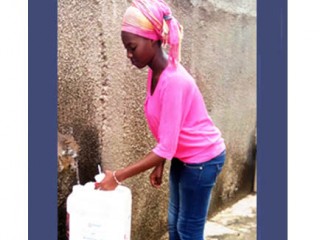Project Results:
The project established a warning system for water shortages in the SONEB water company network, by using ICT. An internet (mobile application SACT-TIC) and SMS based alert system informs clients about planned and unplanned cuts in the water supply and possible options they have to store, treat or get water. In the pilot, the system is tested in 2 areas, and education on how to hygienically go about storing the water was included. The approach is innovative for Benin, because it uses ICT services to communicate with the population. This information is now only available on traditional media.
Key results
The project accomplished:
- App SAC-TIC is available in the app store (Android)
- 400 subscriptions as per July 2019
- Information available in local languages and for the illiterate
- Awareness campaigns on hygiene practices of drinkingwater on household level
Tips for the future
- The app is functioning and is integrated in the operations and maintenance of SONEB. However, to reach more clients and become more useful, new features such as payment options of waterbills should be added.
- Reserve sufficient time and money for marketing
Potential for growth
There is potential for growth if the application SAC-TIC offers more options to clients.
Project partners
PNE (Partenariat National de l ‘Eau), SONEB, EAA, SOLUTIS
Period
July 2017 – July 2019
Location
Cotonou, BeninLast project updates
Background
The populations of the town of Cotonou, the economic capital of Benin, are faced with frequent water discharges (pipe breaks, maintenance of the network etc.), thus creating discomfort in their way of life. These service disruptions necessarily involve significant communication needs to inform customers in real time for taking appropriate preventive measures. Partial coverage of the city of Cotonou; the low economic power of some households forces them to buy water from their neighbors or sometimes even to use wells. The current communication system of the SONEB to inform the populations is limited to the elaboration and the diffusion of a communiqué / warning message through radios, televisions; and social networks such as Facebook. These means of communication do not always make it possible to bring information to the target in time. The big question is how to ensure real-time information for all the population of Cotonou so that they can take preventive measures in accordance with their drinking water consumption habits. By exploring the communication channel environment, mobile phone use appears to be the safest, credible and fastest alternative to reaching households in a fraction of a second. According to the final EMICOV report, 96.6% of households in Cotonou have a mobile phone (2011). This project will strengthen the communication mechanism between SONEB and its subscribers and improve the quality of water consumed in households via mobile telephones in the communication system. The achievements of this pilot project will be capitalized and duplicated in other cities of the country by SONEB.
Project Plan
The project aims to improve the quality of the water consumed by all the population of the municipality of Cotonou in the Department of the Littoral in the Republic of Benin. To achieve this objective, a platform will be set up to inform the population in real time about water cuts and the preventive measures to be taken to guarantee the drinkability of drinking water via the mobile phone. This information will reach the population through the dissemination of messages on all its forms (text, emoticons, audio, video, etc.) Awareness campaigns on the hygiene of drinking water will be organized around the chain of " drinking water supply in order to maintain the quality of the water at all times. Awareness-raising actions based on the Information, Education and Communication (IEC) tools will affect women and children more for a change in behavior at the household level. These actions will be preceded by an Attitudes, Practices and Behavior (CAP) survey to identify current practices adopted by populations during water cut-offs or not before water consumption.
Target group
- Populations in municipality of Cotonou ; - direct subscribers of SONEB ; - non-subscribers who consume either water purchased from subscribers or water from other sources.
Sustainability
Financial sustainability: development of a mobile application to allow users of smartphones to be informed. As a result, communication costs would no longer be borne entirely by the SONEB (cost of sending SMS). The ability to advertise on the platform will dampen operating costs. - Institutional sustainability: at the end of this project, the achievements of this project will be capitalized by the SONEB and the platform integrated into another project of the SONEB relating to the call center - Environmental sustainability: The system to be implemented does not involve a large use of equipment likely to significantly increase the risks of environmental degradation - Technological sustainability: applications will be developed and integrated into the palystore allowing the populations to have all the news published in real time. - Social sustainability: The information will be accessible to all layers in several local languages and will be able to meet the needs of poor populations, women, children and vulnerable groups with regard to water, hygiene and sanitation.
Overview of Goals
- Improve the quality of the water consumed by the population of Cotonou through the development of an information alert system from a platform via mobile phones. o improving the information system on water disruptions and advice on good hygiene practices and low-risk water storage methods via mobile / mobile phones; o improving the storage conditions of drinking water in households in Cotonou; o Capitalize on the achievements of the project.
